When you’re designing a research project, you need to come up with a research questions first. The research question will determine the type of research that you need to carry out, as well as its scope and focus. Once you know your topic and your audience well, it’s time to get going on the process of establishing a clear and effective research question.
There are many types of research questions that you can use depending on the scope or focus of your study. Exploratory, descriptive, and causal are three primary types of questions that you can use when designing your research project. These three different questions will help you choose the right kind of data collection methods in order to answer your ultimate goal. Let’s take a look at each one in detail.
Types of research questions
There are three basic types of questions that research projects can address:
- Exploratory Research Question
- Descriptive research question
- Causal Research Question
We will now look at each of these in some detail.
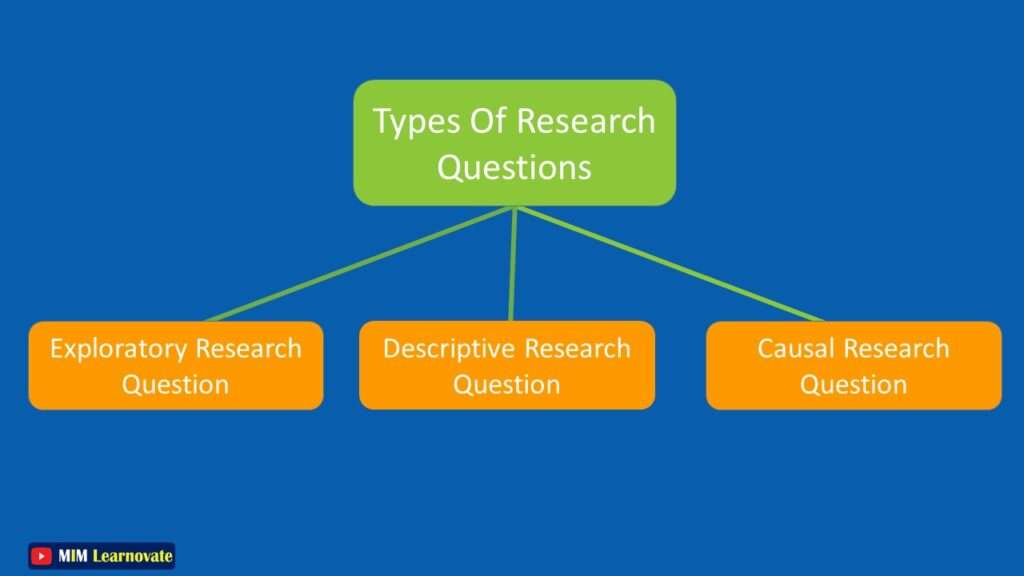
Exploratory Research Questions
Exploratory research questions are those that help you gather preliminary information that will help define the problem and hypotheses. The purpose of this type of question is to help us gain a better understanding of what we are looking for, so that we can later carry out more focused and specific research if needed.
Exploratory research questions are frequently created when:
a) little is known about a particular phenomenon;
b) results from previous studies are ambiguous or have significant flaws;
c) the subject is extremely complex;
d) there is insufficient theory to serve as a guide for the creation of a theoretical framework.
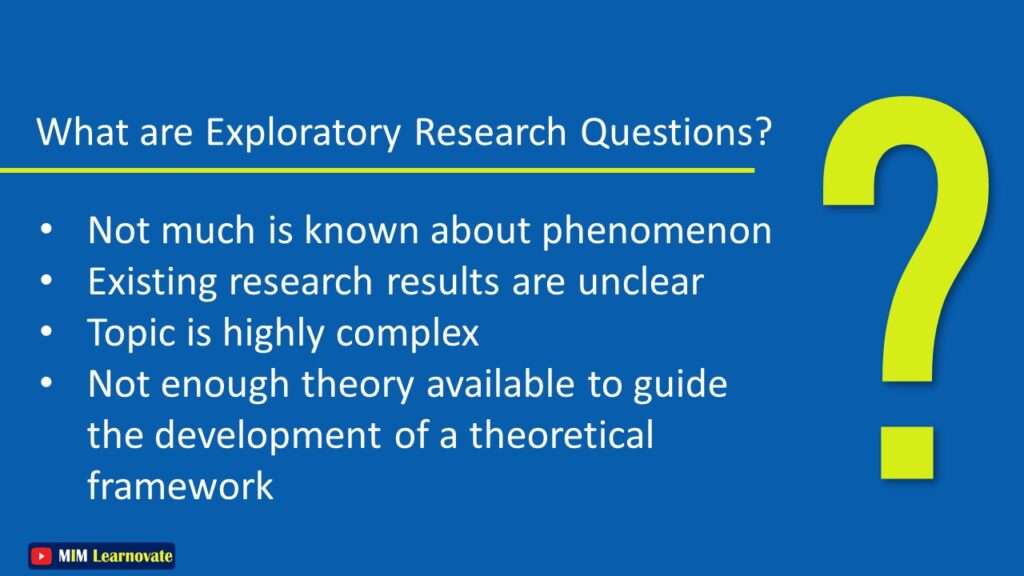
Exploratory research question frequently uses qualitative methodologies to collect data, such as
- focus groups
- interviews
- informal conversations with consumers, employees, and management
Flexible methods are used in exploratory research.

Exploratory research is the type that you do when you want to find out something new and unknown about a subject. It’s also called non-experimental in psychology because it doesn’t involve any controlled experiment like a control group or experimental group.
A good example of an exploratory question would be:
- What are people’s attitudes toward dogs?
This is not an experimental question because there has been no past study done on this topic so we don’t know what attitudes people have towards dogs yet; therefore it would be best if we started by asking many different people for their thoughts about dog ownership instead!
Example of Exploratory Research Questions
Example 1
If employees at a global corporation’s subsidiary in Islamabad City are different from those employed in the United States, the manager of that company is interested to know.

Since there isn’t much information available about Islamabad (aside from the fact that it’s a capital of Pakistan), and because there is a lot of disagreement regarding what work ethic values mean to people from other cultures, the manager’s curiosity can only be sated by conducting an exploratory study that involves speaking with employees in Islamabad-based organizations.

The way that people regard their work varies greatly around the world depending on factors like religion, politics, economics, and social situations, as well as upbringing, cultural values, and other factors.
Here, an exploratory study will need to be conducted because there is so little information available about Pakistani work ethic values.
Example 2
As an example, if you wanted to know how many people in your community were interested in learning about nutrition and health topics such as dieting, exercise and weight loss,.
then an exploratory research question would be
- How many people would like me/us to teach them about these topics?
This question has no right or wrong answer because all it does is give an initial idea of what kind of data might be important.
Descriptive research question
Descriptive research questions are used to describe a situation or phenomenon. This type of question is used to gather information about the nature of a particular phenomena and its characteristics.
Descriptive research questions can be asked in different ways:
By asking an explicit question such as
- “How often do you eat lunch?”
- “What kind of foods do you like?”
By using statements that describe what has been observed, such as
- It was sunny outside today
- The temperature was below freezing.
The purpose of descriptive research is usually not to predict future events but rather just provide information about current behavior (e.g., How many people like this product?)
Data that describe the characteristics of things (such people, organizations, companies, or brands), events, or circumstances are collected as part of descriptive studies. Either quantitative or qualitative methods are used in descriptive research.
It may entail gathering quantitative data, such as
- Customer satisfaction scores
- Production,
- sales
- demographic data
but it may also mean gathering qualitative data.
For instance, qualitative information may be acquired to characterize the decision-making process consumers go through or to look at how managers handle disagreements in workplaces.
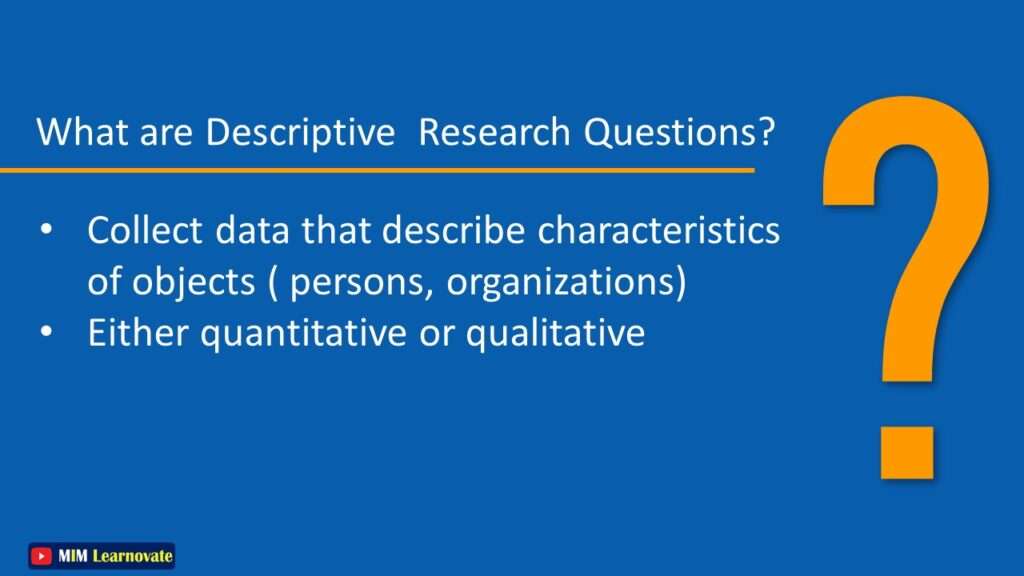
Descriptive research involves gathering data from existing sources such as surveys and interviews before conducting any controlled experiments; this form of questioning allows us to measure our variables against each other to see whether they differ between groups (e.g., men vs women).
For example: “How often do adults read books?”
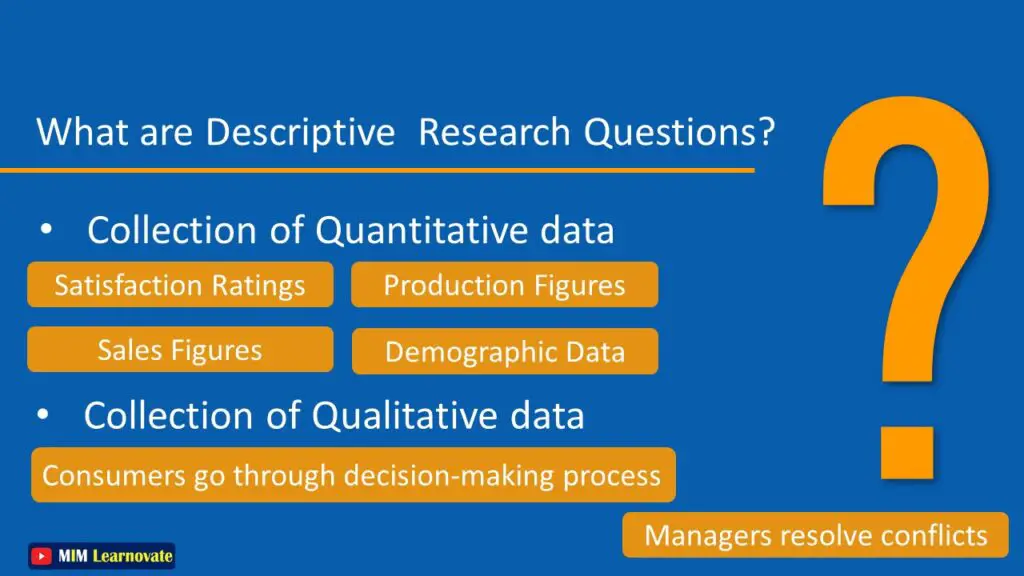
Example of Descriptive Research Question
A CEO might be interested in learning more about how businesses in her sector have incorporated corporate social responsibility into their overall business plan.

Later comparison of the performance levels of particular sorts of organizations may be possible with the help of such information.
Causal Research Question
The goal of causal research questions is to identify causal relationships between variables in order to understand cause and effect. This can be accomplished by testing the hypothesis, or simply by making observations about the relationship between two or more variables.
The definition of “cause” is that which makes something happen; in other words, it’s what makes something happen.
Causal studies examine whether one factor influences another.

When doing a causal study, the researcher seeks to identify one or more contributing causes to a problem.
Example of Causal Research Question
Example 1
Typical examples of causal research questions are:
- What is the impact of a reward system on productivity?
- How do consumer purchasing intentions depend on perceived value?

Example 2
The goal of a causal study is to establish the causal relationship between variables X and Y. Therefore, problem Y is resolved when variable X is changed or eliminated in some way.
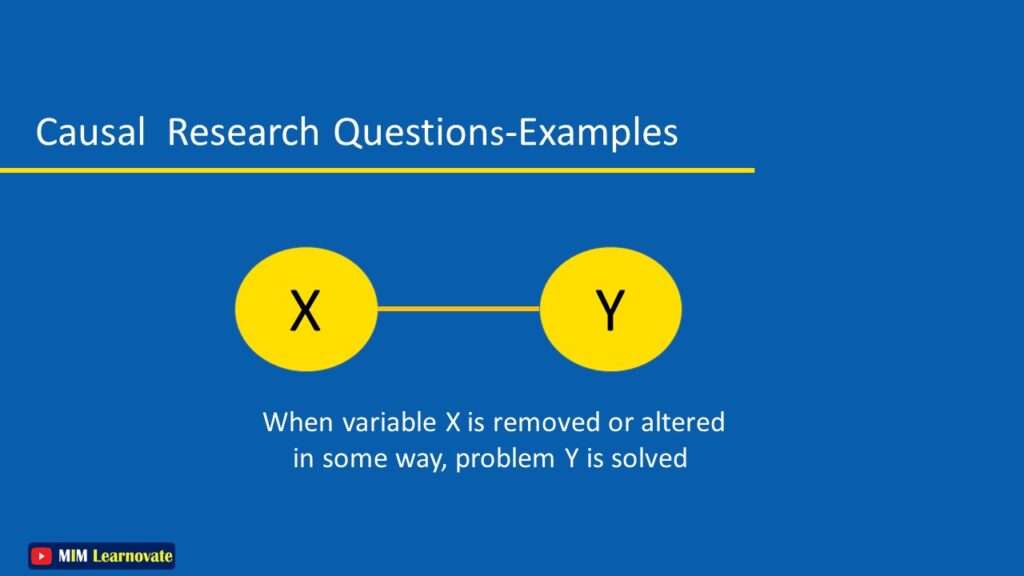
When to develop Research Questions?
Exploratory Research Questions
- Exploratory research is utilized when a topic or problem is brand-new and when gathering data is challenging.
- Mostly when conducting qualitative research.
Descriptive research question
- Can be developed during qualitative and quantitative research.
Causal Research Question
- Can be developed during quantitative research and experimental designs because of the time sequence condition.
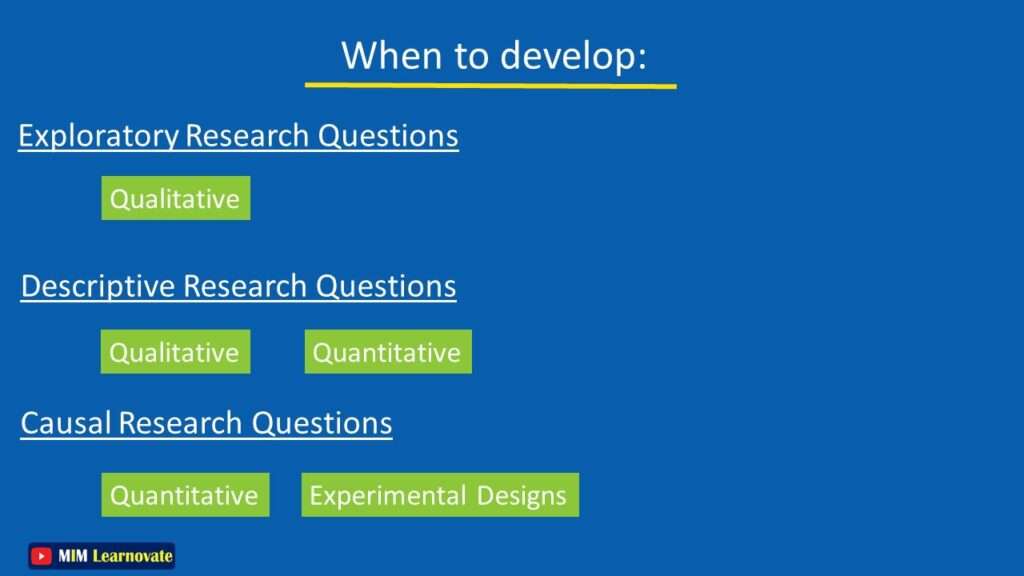
Conclusion
Research questions are the cornerstone of any good research project. They help you to decide what kind of research is needed, how it should be conducted and what results you want to get. In this article we have discussed different types of research questions so that you can choose the most appropriate one for your project!
Other articles
Please read through some of our other articles with examples and explanations if you’d like to learn more about research methodology.
Statistics
Methodology
- Research Methods
- Quantitative Research
- Qualitative Research
- Case Study Research
- Survey Research
- Conclusive Research
- Descriptive Research
- Cross-Sectional Research
- Theoretical Framework
- Conceptual Framework
- Triangulation
- Grounded Theory
- Quasi-Experimental Design
- Mixed Method
- Correlational Research
- Randomized Controlled Trial
- Stratified Sampling
- Ethnography
- Ghost Authorship
- Secondary Data Collection
- Primary Data Collection
- Ex-Post-Facto
Research
- Table of Contents
- Dissertation Topic
- Synopsis
- Thesis Statement
- Research Proposal
- Research Questions
- Research Problem
- Research Gap
- Types of Research Gaps
- Variables
- Operationalization of Variables
- Literature Review
- Research Hypothesis
- Questionnaire
- Abstract
- Validity
- Reliability
- Measurement of Scale
- Sampling Techniques
- Acknowledgements




1 Comment
This really answered my downside, thanks!